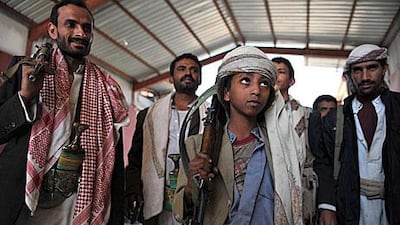SANAA // Yemen's main opposition coalition has turned down a request by the country's foreign minister to delay next month's presidential elections.
"Talks about postponing the election are completely rejected," said Mohammed Qahtan, a leader in the coalition, the Joint Meeting Parties (JMP), said yesterday.
Abu Bakr Al Qirbi, the foreign minister, told Al Arabiya TV in an interview that aired on Tuesday that "it will be difficult to have elections on February 21" if the security situation in the country was not resolved.
Under a Gulf Cooperation Council-brokered deal, Ali Abdullah Saleh, the president, agreed to step down from power in return for immunity from prosecution for him and his inner circle. His vice president, Abdurabu Mansur Al Hadi, would be the only presidential candidate in the elections and will replace him.
The immunity clause in the deal has proved controversial as it includes protection for some of those who were behind the crackdowns that killed hundreds of protesters during the uprising.
The plan is for Mr Hadi to lead Yemen during a two-year transition period in which the army will be restructured, the constitution reviewed and reconciliation talks held with various tribal groups.
"The country cannot tolerate any more bloodshed. Postponing of the elections for a month or two means handing over the country to Al Qaeda and spreading chaos," said Mr Qahtan.
The European Union ambassador to Yemen. Michele Cervone d'Urso, said there was no reason to delay the election.
"The election should be held next month as the Gulf initiative states. We are expecting the nomination of Hadi will be approved by the parliament in the coming few days. We believe there is no excuse for the postponement," Mr d'Urso told The National yesterday.
Talks about a possible delay followed news that suspected Al Qaeda militants had on Monday seized control of Radaa, about 160 kilometres south of Sanaa, and then broke into its jail to free more than 200 prisoners.
Local residents said yesterday the situation remained tense as the militants were in control of parts of the town, while armed tribesmen had spread across others and set up checkpoints.
Tribal leaders said a meeting was held yesterday in the provincial capital, Bayda, in which they held the security and army forces loyal to Mr Saleh accountable for the militants' takeover of the city. They asked the leaders of those forces to restore the city to normal or let tribesmen carry out the task.
The opposition has accused Mr Saleh of allowing the militants to overrun Radaa and two other towns in southern Abyan province, which borders Bayda, captured previously - Zinjibar and Jaar - to bolster his claims that he must remain in power to secure the country against Islamist militants.
malqadhi@thenational.ae
* With additional reporting by the Associated Press

